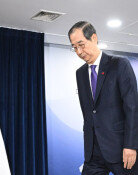[Editorial] South-North issue & next administration
[Editorial] South-North issue & next administration
Posted July. 16, 2000 09:55,
President Kim Dae-Jung is quoted to have made some comments at his meeting with Japanese Foreign Minister Yohei Kono about the future of inter-Korean relations and the next administration after his present government. The comments are now creating a tempest in a teapot in our political circles.
President Kim apparently relayed to Kono that Pyongyang came to have confidence and trust in us because of his unswerving pro-democracy fight in the past as well as his coherence in the execution of his North Korea policies. But, he also said he heard about the North Korean worries if Seoul`s next administration would keep its coherent stand to push ahead with the present government`s North Korea policies.
Chong Wa Dae and the ruling Millennium Democratic Party clarified the controversial statements to mean nothing but to simply convey Pyongyang`s worries about the future of consistent, inter-Korean relations. But, the opposition Grand National Party (GNP) took it otherwise. The President`s remarks in question, according to the GNP, can logically lead to a misunderstanding as saying that only his administration represented pro-unification forces as contrasted with the next administration`s anti-unification orientation. Thus, the comments were taken as an unwitting exposure of his hidden intentions to relate the inter-Korean affairs with the creation of the next administration. The GNP`s suspicion is that this may be an indication of the scheme to stay in power for long by the use of the North Korea card in the next presidential election.
Different analytical dimensions may lead one to read different intentions into President Kim`s remarks. We are not in a position to make right now a sure judgment on what the President`s real motives, if any, were in making such comments. In its recent editorials, this daily emphasized time and again on the imperative need that propriety dictates the discreet exercise of one`s prudence on inter-Korean issues for our fatherland`s future. For, deep-seated conflict and discord still overwhelm the affairs of the two Koreas, be they the issues that divide the South and the North or our own society in the South.
What must be alerted against here is to approach or interpret the South-North issues from the standpoint of political power games. This will only result in counter-productive, partisan political infighting that will further divide our national consensus and worsen the inter-Korean relations. For that reason, we clearly pointed out in our recent editorial what was wrong with the indiscreet statements made by a high-ranking official at the President`s office. The statements warned opposition party leader Lee Hoi-Chang of his great loss of face, were he delusioned to think that he already secured the next Presidency.
We are also of the opinion that President Kim`s remarks in question have sufficient grounds to cause a misunderstanding. Despite Chong Wa Dae`s clarification that it was nothing but a simple relaying of Pyongyang`s apprehensions about the future of the two Koreas, the remark was not timely because it was made immediately after Pyongyang`s graphic slanders against opposition leader Lee. President Kim`s statements can easily be taken to convey that Pyongyang does not expect any consistency from the Grand National Party`s North Korea policies and that the Millennium Democratic Party must, therefore, regain power under the circumstances in the next presidential election.
To be sure, it is the historic mission of our administration under any President to promote inter-Korean reconciliation and cooperation. Thus, it is imperative that this mission must be undertaken, free from affiliations of any political forces, in a transparent manner and with a secure national consensus as well as the nation`s future in mind. Our stand should not be drifted or swayed by Pyongyang`s preferences and intentions, to say the least.







